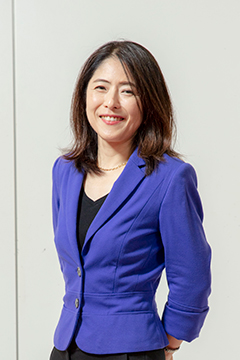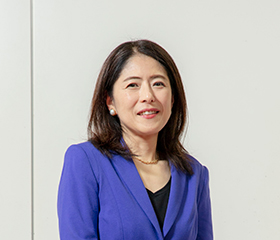
DEGREEs: Ph.D. from Science, Technology and Innovation Policy from Sussex University Science Policy Research Institute; Master's Degree from Sussex University Institute of Developmental Science; Imperial College Diploma in Environment Management from London University
EXPERTISE: Science, Technology and Innovation Policy for SDGs for sustainable development in developing and emerging countries; Innovation policy for natural resources and agriculture.
Q: You started your career from Developmental Science. May I know how you reached your current research?
A: I had been thinking of being involved in supporting developing countries at an international organization ever since I was a high school student. When looking for a Master's program for my graduate education, my mentor recommended me to study in the U.K. that has substantial experience on colony policy research, as there was no place in Japan that offered a program for research on developing countries. Among the universities in the U.K., I chose Sussex University as it has a research institute on developmental science. While there I was convinced through discussing with my friends, that I had very little knowledge about Japan's developmental policy. Thus, before working at an international organization, I joined the International Development Center of Japan (IDCJ) to learn the Japanese government policy on the developing countries and stayed there for three years. Then, I won the competition to join the "Sustainable Environment and Human Settlements Program" of the United Nations Economic Commission for Latin America and the Caribbean (ECLAC).
One of the ECLAC's essential missions is to follow the UN's development agenda from the region's viewpoint. Now, the UN has a comprehensive agenda of "sustainable development Goals (SDGs)," but when I was working for them, the agenda was different by the field as seen in that the environment was wrapped in "Agenda 21" and human settlements was in "Hibitat Agenda." My role was, as a member of a team, to provide an expert's view toward attaining the goals of "good settling environment" and "environment" through discussions and agreements on indexes and benchmarks with the government officials in the region.
After finishing my work at the United Nations, I returned to Japan and joined a Japan International Cooperation Agency (JICA) project that promotes government and regional exports in Chile. And I was tasked to take care of the export promotion policy using natural resource industries in southern Chile. This has led me to my Ph.D. thesis of catchup and technology innovation of salmon export industries in Chile. This experience convinced me that developing countries are aware that they need policies for good use of natural resources, but no research has been made. So, I continued to do the research at the UNU-Maastricht Technology Innovation and Social Science Research Institute (MERIT) where I worked as a research fellow after obtaining my Ph.D. Even now, I am collaborating with Latin American researchers to work on a project for developing a value chain in mining industries contracted by the Inter-American Development Bank. I had the opportunity of discussiing with researchers, administrators and students from developing countries through collaborative research and training sessions, which enriched my understanding of the S&T policies in developing countries. I joined GRIPS in April 2018. I wish to continue my research using the network I have established with many people overseas.
Q: What does it mean that policies intervene the natural resources & development and S&T?
A: As you may know from the phrase of "resource curse," the natural resources in developing countries have long been thought to be preventing the countries from developing. As a matter of fact, many policies have been established based on the "resource curse." However, as seen in "Industry 4.0," the new technologies, including satellite data and automatic control technologies, are now introduced into agriculture and mining industries that were wrapped up as "Low Tech." For example, mining industries have such innovations as drones that can fly under low air pressure in the mountains and excavators that can operate on uneven ground. Also, the value chain that is deepened in accordance with the globalization of industrial activities is substantially affecting the social issues in these low tech sectors, including environment and labor standard. There are many policy issues that are critical to be studied as to how to use the income from the resources for sustainable development.
Q: Would you brief "disruptive inclusive innovation"?

A: In February 2019 we held a round table and a symposium "disruptive inclusive innovation" at GRIPS to connect developing countries and S&T where successful models and promising cases were introduced.
"Disruptive inclusive innovation" means such innovation that provides solutions to those who do not have the services offered by the private and public sectors (inclusive). As it brings new consumption that was not found in the past, it leads to disruptive innovation.
Now, the developing countries, including African countries, have increasingly been concerned with S&T. However, the issues are the lack of human resources and excellent people's moving abroad. The main countermeasures are to enrich the university education and to improve the public research institutions, but they are not sufficient enough to use the research results in the market. A new measure, not an aid that has been provided in the past, is needed. To meet the need, such measures are taken as inviting a private R&D capable startups and shifting faculty members' mindset from academic to practical. In the symposium above, a venture capitalist commented that in addition to the high social needs, large market and non-strict regulations, non-existence of already-established infrastructure are the margin for new consumption and potential. Of course, such issues as compliance are left to be solved. In other words, taking various actors and potential consumers into innovation process is "inclusive" and also "disruptive" as it is an innovative approach to solve social issues.
A: The recent innovation requires "spreading the base technology" as it becomes the "medium" to know whether the next business model meets the needs. For example, the spreading use of mobile phones has changed the finance in developing countries. Low pricing is important for spreading technologies. The higher the price is, the less possible the product is accepted, which does not drive a large-scale social change. So, disruptive innovation should originally be inclusive. Inclusive innovation has a disruptive aspect. The number of industries that are aware of this would be few.
The "Industry X.0" will change the companies from self-contained to ecosystem-type. The society will be interconnected by digitization, which will expand the market possibilities. Thus, it is important to have diversity by adding an inclusive viewpoint to those who have not been the users.
Q: Depending on the life cycles of the products, it would be difficult for some of them to have low prices?
A: It would not always go that way. Typical examples are the low-priced malaria diagnosis kit "Paracheck" developed by an Indian company and "Nano" by India's Tata Motors that succeeded in disruptive low-pricing by reducing the number of parts without decreasing the strengths. To expand the market to those who were not able to buy the products because they were not affordable to them, it is important to begin from an early designing stage to enable "good products at lower prices." There are many technologies that end up not to be used because of the high prices. The market in the past was led by suppliers, but now important is the demand. The developing countries can become not only the new market, but also be potential for the seed bed of innovation.
As GRIPS has many mid-career foreign students, I prioritize on discussions that connects theories and practices in my classes. I ask them to explain the theory and then make a presentation on a case that goes with the theory. The students in this way can deepen their understanding in practice by connecting the theory, framework of their thinking, and indexes. I can also learn a lot from the presentations on the students' experiences. I am also asking the students to take part in the policy research that was contracted by the United Nations Industrial Development Organization (UNIDO). I believe that they can learn the importance of theory from the process of solving a detailed social issue.